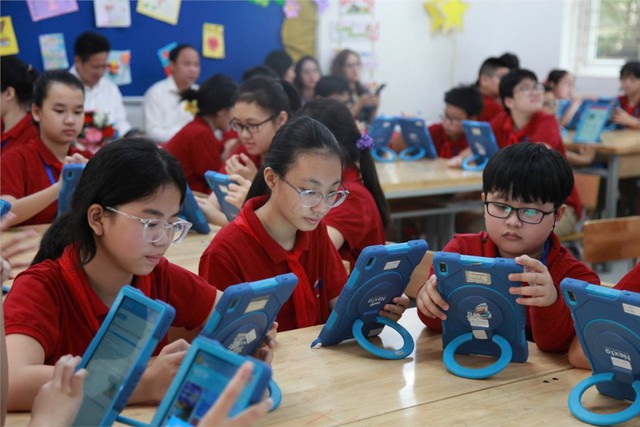AI education models are applied in five schools
VGP - The Ha Noi Department of Education and Training selected five schools to pilot the "Building a Smart Education Model for Ha Noi Schools" project, according to Nguyen Quang Tuan, Deputy Director of the department.

Students of Nguyen Dinh Chieu Secondary School
The five schools include Kindergarten B in Hoan Kiem District, Le Van Tam Primary School and Nguyen Dinh Chieu Secondary School in Hai Ba Trung District, Chu Van An Secondary School in Long Bien District, Phan Huy Chu High School in Dong Da District.
Smart education is a concept that uses information technology to improve education by providing more time, space, learning resources, and better methods. The project seeks to boost digital transformation to all levels of education in Ha Noi, from kindergarten to high school.
The smart classroom is at the heart of a smart school, and it is outfitted with smart technology such as interactive screens and tablets. Artificial intelligence (AI) in particular enables facial recognition, emotional assessment of students, and evaluation of teacher communication performance.
It was developed in line with different conditions of each school, including AI, digital technology, interactive devices, tablets, interactive screens, virtual reality devices, and production of 3D virtual reality content.
Nguyen Chan Hung from Ha Noi University of Science and Technology said that a smart classroom needs high-end infrastructure, a high-speed network that can connect more than 50 tablets to the Internet, and the latest models of interactive screens that allow teachers to write and connect to tablets in a unified ecosystem. "In addition, students' work will be sent to teachers immediately, which will help improve teacher-student interaction."
In particular, the built-in AI helps to automatically measure the average emotions of the class as well as the emotions of each student, allowing the teacher to determine who is interested in learning and change the approach so that students are always engaged in the lesson.
The smart classroom can also automatically convert itself into digital materials, turning the entire lecture into a video book that is uploaded to the repository. Students can play it back to review after the class is over. This helps students better understand the lesson and absent students can study the lecture on their own.
If the pilot at the five schools mentioned above is successful, the project is expected to be adopted in November. After that, the Ha Noi Department of Education and Training will take stock and replicate the model in other schools in the city.
Developing high-quality education
Earlier, Prime Minister Pham Minh Chinh attended the opening ceremony at Nguyen Dinh Secondary School in Ha Noi on September 5.
The Government chief underlined the importance of quality improvement, university autonomy, investment attraction and innovation in technology fields such as semiconductors and AI.
He urged improvements in the quality of education and diverse training models, supporting community integration for people with disabilities and ensuring equal educational opportunities for all students
Chairman of the Ha Noi People's Committee Tran Sy Thanh asked the local educational sector to comprehensively improve the scale as well as quality of education so as to gradually turn the capital city into a large and typical centre of high-quality education and training in Viet Nam.
The mayor made the request while speaking at the sector's conference held on August 14 to review the 2023 - 2024 academic year and launch tasks for the next on this August.
In the 2023 - 2024 academic year, there were 2,913 kindergartens and schools of general education across the city, increasing 39 schools from the previous academic year, with nearly 2.3 million students and nearly 130,000 teachers.
Local students' performance in this year's high school graduation examination climbed five places to the 11th from the 16th position in 2023. Up to 99.81% of exam takers passed the test, rising 0.25% from last year.
The educational sector set up 10 focal tasks, including reviewing and perfecting the development plan for the local network of education - training establishments; improving the quality of teachers and education managers; effectively implementing the pre-school, general education, and continuing education programmes; and attracting and efficiently using investment resources for education.
The tasks aim to address shortcomings and problems of previous years, enhance discipline and democracy in schools, build a safe, healthy and friendly educational environment, and better quality at all levels of education - training, the director noted../.

